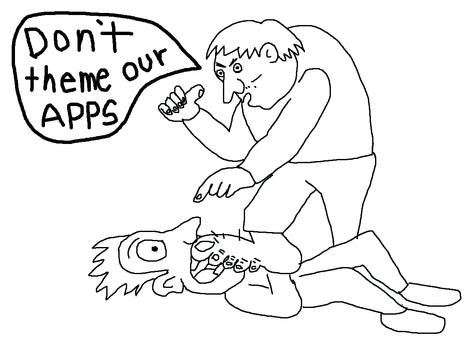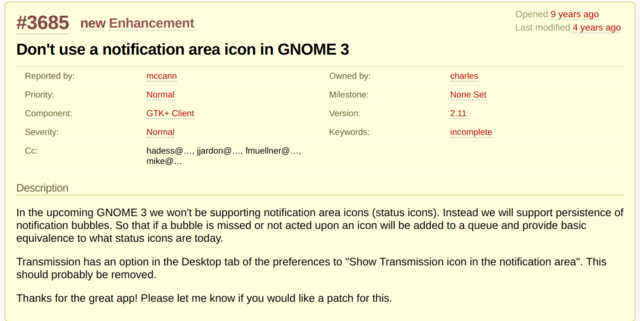GNOME Developers have Made Their Moves against Themes
The GNOME community has been debating removing theme support to secure a "consistent GNOME experience" for quite some time. A hand-full of developers of some GNOME apps have now published an "open letter" to "the community" asking distributions to not include custom themes.
Their Argument against Your Personal Freedom to customize Your Desktop

The developers of some apps for GNOME such as "Icon Preview", "Fractal" and "Podcasts" and GNOME UX designers pretending not to be directly involved in GNOME design argue that GTK Stylesheets "can make applications look broken". This is a non-issue for properly designed software which uses a themes primary colors instead of requiring special CSS. GNOME developers actually admit that Xfce programs do not have this problem because they do not use "custom" styling.
"If you abuse the toolkit and rely on Adwaita-specific quirks and workarounds, you only have yourself to blame for breaking your own applications. Instead, you should make your applications standards-compliant and either use valid classes and widgets from the GTK spec, or carefully ensure that your custom widgets can stand on their own without Adwaita.
If you find a genuine theme bug in a GTK theme, you can report it, but telling everyone to stop developing and shipping their own themes on their desktops is never going to happen. Ever. Either you remove theme support from GTK, or you learn to develop a standardized theme API, and develop standards-compliant applications that adhere to that specification.
(..)
Your application won't break when the system theme changes if you set your style classes correctly.
If you're using a widget in a completely different way than what it was intended to be used, you should expect to have to address for that in your application, not relying on Adwaita and other theme developers to fix it for you with a unique rule specific for your application."
Software developers outside the GNOME bubble make an effort to ensure that their application works on all desktops using a variety of themes. That's why kdenlive works fine on any desktop using any theme. GNOME developers appear to only look at how their "apps" look in the GNOME desktop environment using the stock theme.
GNOME developers are also complaining that "Icon Themes can change icon metaphors, leading to interfaces with icons that don’t express what the developer intended.". That's no reason not to use themes. If a theme shows a totally inappropriate icon then that's a theme-specific problem. Some guy drunk-driving is not a good reason to ban cars. Standard icon names are well defines[1]. A themes folder will typically be something recognizable as a folder and it would be up to the theme creator(s) to fix it if it's not.
The thought-process behind the "Do not theme" campaign becomes clearer with the statement "Changing an app’s icon denies the developer the possibility to control their brand." This is about controlling users.
""Control over the use of one's ideas" really constitutes control over other people's lives; and it is usually used to make their lives more difficult."
Many Linux users prefer being able to apply themes instead of having someone who feels entitled to make these decisions dictate how their desktop should look and behave.

It is important to be aware that this line of thinking has plagued GNOME for quite some time and this latest move against themes is not something that came out of nowhere. It's been a few years since we first noticed GNOME developers argue against having theme support in GTK and GNOME because it results in users having "an inconsistent GNOME experience".
"Since you guys got infected by the "I-wanna-be-a-Mac" syndrome and the phoneworms severely hit around the dawn of the GTK3 era, all I've seen coming out from the project is contempt towards its end users. Bunch of ill-thought design decisions (from CSR to constant theme breakages) have been doing nothing but drive users away... even if our own interaction with GNOME is using GTK apps on other DEs! (my particular case is quite particular: my DE of choice is MATE, which was pretty much forced to move to GTK3... and I've seen nothing but UI breakages along the way, outside the control of MATE, sadly)
This is nothing but yet another "my way or the highway" situation, as I say it not as a developer, but as an END USER which has been bitten hard by the endless theme breakages product of changes-for-the-sake-of-change upstream: just ask to the author of my theme of choice (https://github.com/jpfleury/clearlooks-phenix ), which ended walking out in disgust the last time upstream broke themes (now I have a broken theme because I am supposed to embrace the "one-and-true" Adwaita Way). All I can get from this is a thinly disguised excuse to rip out theme support completely, since that's how it's done on smartdevices, where users are assumed to be too dumb for their own good and therefore should have no control and no choices."
GTK has already removed support for setting custom toolbar icon sizes to the detriment of people with poor eye-sight or HiDPI monitors. There's only a matter of time before theme-support will be removed entirely if there is no push-back and chances are high it will happen even if there is.
"Typical gnome devs, wanting to take away features....
Theming and customization are what makes linux linux, if I wanted to have a locked down interface and colors I would just use OSX or windows all the time."
The only good news is that Qt/KDE is not on board with GNOME's nonsense. It would be sad if there were no alternatives for those who like menubars, tray icons, desktop icons, custom themes and the option of changing the wallpaper (GNOME has removed all but the last feature. It will probably be removed soon).
The software authors vs distributions and users argument in general is not new. At the core it reminds us of the OpenBSD vs. QMail argument where DJB wanted to prevent changes to the code even though it made QMail's behavior non-standard in the OpenBSD environment.
"When I read phrases like "pixel design", "business perspective", and the dreaded "UX studies" term, I take that you guys actually wanted to be in the Mac/cellphones software area, not making opensource software for *nix distros. Go make proprietary "apps" and sell them to people that don't care about having a single line of thinking instead."
"If you want to make sure that nobody modifies your app, why not release it as proprietary software? I think GNOME developers are failing to see what Free software implies, even though GNOME is supposed to be a GNU project."
There is always the option of not bothering the free software community with dictatorial demands; it is quite possible to develop proprietary software for iOS or MacOS or Windows. Quite a few of the current GNOME developers should look into it.
You can read the appeal to stop theming GNOME software here: https://stopthemingmy.app/
footnotes


Enable comment auto-refresher
Rms
Permalink |
Gigith
Permalink |